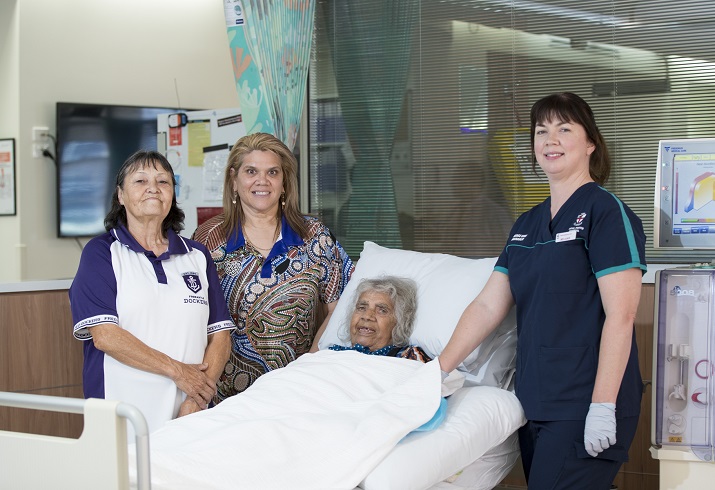EMHS Wool-lar Aboriginal Volunteer Program

The EMHS Aboriginal Volunteer Program has now started, with the delightful “Aunty Gail” spreading her infectious calmness and caring nature across the RPH Dialysis Unit.
Wool-lar is a Whadjuk Noongar word meaning “celebration” or “happy times” and is reflective of the aim of the program.
Gail Wynne is the first volunteer with the new program which has the strong backing of the Aboriginal Health Community Advisory Groups.
"I'm a former patient of RPH myself and it is so lovely to be able to give back to the community and provide comfort to Aboriginal people in hospital," Gail said.
For project officer with the EMHS Aboriginal Health Team, Maxine Nicholson-Turner, the start of the program – which she helped develop – was especially significant by having her own “Aunty Gail” come on board.”
“She really is my Aunty and I’m so proud of her for putting her hand up to assist with such a vital role in the Aboriginal community,” Maxine said.
Maxine explained that the primary goal in establishing program was to provide cultural support to Aboriginal patients while in hospital in a volunteer capacity.
“It is all part of supporting the overall health experience and wellbeing of Aboriginal patients,” Maxine explained.
“Isolation for Aboriginal patients may impact on their recovery, increase anxiety, and add to one’s sense of cultural and family disconnection.”
“In establishing the program, we consulted with key EMHS leads, RPH staff and the Aboriginal community in the areas of volunteering, patient support and patient care,” she said.
“The result being a staged approach to the Aboriginal Volunteer Program commencing with a pilot at RPH in Ward 6C Haemodialysis Unit.
“I established the EMHS Aboriginal Volunteer Working Group with 14 members from across RPH, EMHS (clinical and corporate) and Aboriginal community representation with extensive knowledge, expertise and skills in the areas of health and wellbeing.
“It is that working group that has contributed to the development and planning for the EMHS Aboriginal Volunteer Program.”
Supervision and ongoing support is provided by Maxine herself, as the Aboriginal Coordinator of the Program, Melanie McNeice as the Dialysis Nurse Unit Manager (NUM) and Denese Griffin as Aboriginal Health Service Unit Director.
Melanie was full of praise for the program, saying that it was important for Aboriginal patients to have their spiritual and cultural connection met when in hospital.
“Dialysis patients are in the chair for four to five hours, three times a week, for the rest of their lives – to give them the ability to yarn with someone while there is of great comfort to them.”
Melanie added that plans were in place to expand the program to include a range of art and craft type activities which could be undertaken during treatment programs.
Denese said she was so proud of her team to have been able to implement the program which “the community has been asking for such a long time."
“Right now it is just a pilot program – but we can already see how successful it will be,” Denese said.
“With more volunteers, the long-term plan is to expand the program to other wards and incorporate the other EMHS hospitals also.”
If you, or someone you know, are interested in joining this fantastic program please fill out this Expression of Interest Form (Word 350KB) and email it to the EMHS Aboriginal Volunteer team at EMHS.AboriginalVolunteers@health.wa.gov.au.

